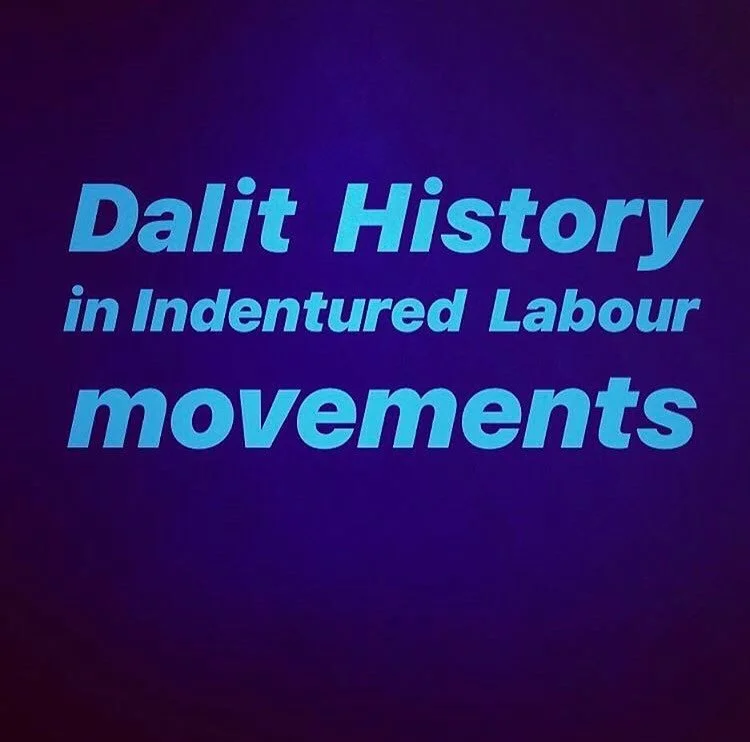Dalit History
This post will specifically engage in caste politics/casteism in indentured communities and their descendants: Caste locations and histories in indentured labour/movement communities and diasporas are often complicated and complex. Some folks know of their caste histories and backgrounds, and many do not. For folks who do not know, there usually is a generalized understanding that folks of lower caste, Dalit, and other oppressed backgrounds were the only communities who were taken as indentured labourers.
This is not the case, as there was a mix of all different casted folks, and Adivasi/Indigenous folks, in indentured labour movements, but yes there was definitely less brahmins and other upper/dominant caste folks as a whole, when you look at indentured labour histories to different islands/nations/countries. It is also true, many people changed their names before/during indentureship and after to hide their caste.
What I want to focus on is how when folks don't know for sure, there is a automatic response to claim to be Dalit as a way to respond against, and fight against casteism.
This can be dangerous, especially when these folks participate in, and relate to, huge parts of their identities to casteist practices, dominant cultural norms, religious celebrations that have oppressive origins, policed food habits, caste based marriage practices, oppressive language/slurs. This commonly shows up in different ways when we reclaim parts of our identities in relation to being descendants of indentured labourers. Many folks who do not know, can assume and figure out their caste location based on what their communities and families practice in terms of religion, what kind of meats they consume, how they speak/ language, or how their families know, and are reminded, that they are a "chota jat (low-caste)." And some people may never find out. There have been many inter-caste marriages among indentured communities as well, and names are complicated in our communities.
I think not knowing is an important part of these histories. To not know is okay, because there have been a lot of erasures. Now, not knowing, does not excuse casteist behaviors and practices. For communities who come from indentured/coolie/kuli backgrounds, caste and casteism does exist. One key element is that we often say that our histories and communities are post caste, that indentured labour brought people of all caste backgrounds together and we aren't as rigid as folks from the subcontinent. This is not true, because even though we might not practice caste in exactly the same ways folks from the subcontinent do, caste has been shaped differently to adapt to our diasporas. Because your "culture" is derived from your caste.
I think for descendants who do not know, but have some general idea of their caste backgrounds, it is okay to not know. I think language is powerful. And you cannot exchange for believing/knowing to be of low-caste/ inter-caste backgrounds for being Dalit. This is very dangerous, especially when these folks are from communities and families, in indentured communities, who are highly casteist in their practices and beliefs (even claiming to be post-caste).
Also claiming Dalitness casually is so harmful/disrespectful to folks and communities, both to Dalits from indentured backgrounds and to those not, who do know, and face the physical, emotional, and structural violences of being dalit on a daily basis. It also deeply disregards dalit histories, activism, art practices, survival stories, especially when they counter things many folks from indenture communities are trying to reclaim. Remember, low-caste does not automatically mean Dalit. I'll say it again, it's okay to not know.
You can not know and still fight casteism, in our communities and against dominant caste folks from the subcontinent who are casteist against descendants of indentured labourers. Which is very real, upper-caste/dominant caste folks from the subcontinent, and in their diasporas, are extremely casteist to descendants of indentured labour. Those experiences can both exist. Descendants of indentured labourers can/do experience casteist violence from subcontinent folks, and they can also be complicit in and propagate dominant caste beliefs/violences within their own indentured communities.
I will share more on this as we go, as well as share different caste histories in the many countries/islands/nations indentured communities are a part of.
Reading link below has some statistics about caste backgrounds during indentured labour movements/displacement, which obviously doesn't capture the complexities of the Dalit diaspora in relation to indenture, but it's one starting point. Also, there are loads of Dalits writing, talking, creating about their different and complex histories, as well as their stories of generations of resistance. No need to read about it from upper caste/ dominant caste people, learn from dalit people themselves because oppressors can’t and will not (and many just don’t want to) get it right.
Adding final note, to why low-caste does not equal Dalit automatically because there have been histories and current situations where low-caste people have also inflicted violence on Dalits, please read up on that to learn more and how those dynamics come into play both historically and current events.
-Esha (2019)
Reading link: http://scientificresearchjournal.com/wp-content/uploads/2017/08/Social-Science-4_A-383-392-Full-Paper.pdf
